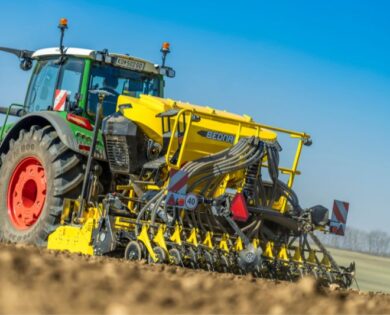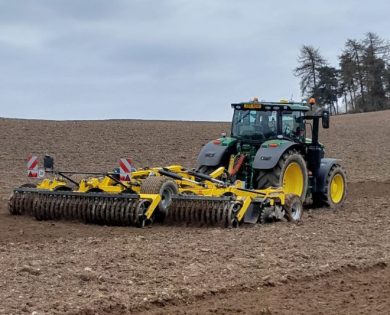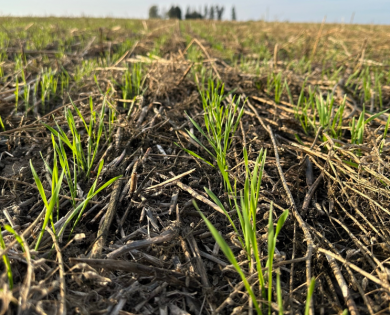This year’s winter has given farmers the opportunity to get back to their land a little earlier than expected. One of the first to seize the moment was ZAS Bečvarya.s. in the Kolín district, where the new season began in earnest in mid-February.
The reason why the seedbed preparation started so early was putting the spring wheat into crop rotation. The Bečvary cooperative company of farms stretches out over an area of roughly 4500ha. Its crop production is based on growing traditional grains and rapeseed over an area of approx. 550 ha as well as sugar beet over approx. 480 ha.Corn is grown both for kernels and for the needs of biogas installations, which also have an important place in crop planning. Another integral part of the crop planning is for the extensive animal husbandry with a production of 8000 l of milk per dairy cow and the production of beef and pork. The reason for our visit to the farm was to see the Swifter SE seedbed cultivator with a working width of 12 metres put to work for the very first time, which the farmers in Bečváry ordered at last year’s Agritechnica exhibition.
Why 600 hp over a working width of 12 metres?
When working their seedbeds, Bečvary sow using a machine with passive preparation. This year, the new Swifter SE 12 000 was added to their current range of cultivators. Looking at the newly formed setup, consisting of a caterpillar tractor and cultivator with 12-metre working width, the obvious question is ‘why not use a wider width?’.For Bečvary, the reason is simple – the varied sizes of land, frequent and relatively long passes. ‘Some of the land we farm is approx. 30 km from Bečváry, and the Swifter SE cultivator attracted us with its compact size in preparation; it is no huge monster and it can be easily folded without having to get out of the tractor,’ says the business’s main agronomist, Ing. Nedvěd.

The newly created setup – the Swifter SW 1200 and a 600-horsepower tractor.

Soil preparation was immediately followed by sowing.
Early preparation is important
Seedbed cultivation is a prerequisite for the quality sowing of spring wheat, securing a quality seedbed, preserving good moisture conditions and aerating the topsoil. As such, it is a good idea to loosen the soil in the autumn down to a depth of 20 to 25 cm, and then in early spring prepare the seedbeds with a cultivator, which is exactly what they did in Bečváry. Their land, stretching over an area of 30 hectares between the villages of Kbel and Lošany, was tilled after the sugar beet harvest in the autumn using a deep cultivator, and was now prepared using the new Swifter cultivator which encompasses all working operations in just one pass. As well as seedbed preparation, fertiliser was applied with a traditional distribution distributor shortly before the cultivator was used.

The Swifter’s basic features are have been complimented with track eradicators, a front strip levelling bar hydraulically controlled from the tractor cabin, and a rear Finish roller.

In order to preserve moisture and sown crops, the cultivator’s working depth was set to 5 cm.
Spring wheat has a finer root system than other spring crops (like barley and oat), and as such is more sensitive to drought. You must prepare a quality seedbed for it and sow it before all other spring crops, as long as the moisture and temperature conditions are accommodating (usually in March), or in years with a dry winter, like this year, now in February. In order to preserve moisture and sown crops, the cultivator’s working depth was set to 5 cm.
‘Keeping to early agro-technical schedules is very important, particularly from spring. Sowing late can result in reduced yields of roughly 40-60 kg/ha per day depending on the variety. Late sowing results in poor growth and development conditions over the whole vegetation period, growth is uneven and the number of plants which appear is lower,’ says Ing. Nedvěd, and we wish him well getting his land tilled in time and with great quality, and believe he will be more than satisfied with his new cultivator.
GALLERY
 BEDNAR FMT
BEDNAR FMT







